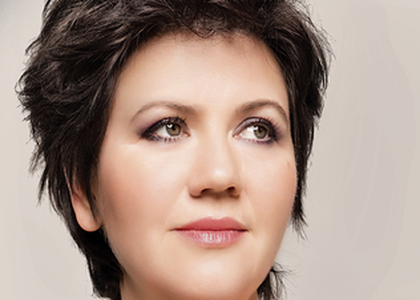> [Archived] Interviews

Interview with pianist Dana Ciocârlie
On Friday, 16th of June, the National Radio Orchestra will be performing under the baton of conductor Christoph König, in a concert with compositions by Albert Dietrich, Wolfgang Amadeus Mozart and Ludwig van Beethoven. Dana Ciocârlie will perform the solo part of Concerto No. 25 in C major, K. 503 for piano and orchestra by Mozart.
It's your first collaboration with the evening's conductor. How do you usually approach such an opportunity?
I think of him as a chamber music partner. In music in particular there is some kind of nonverbal communication. We don't necessarily have to talk about philosophy for me to immediately have a grasp of what his philosophy is, his vision of music, and then we try and find a middle ground so that we can make chamber music with an orchestra.
What do you think your reunion with the Romanian audience will be like?
I think it is by far the most emotional place for me. At the same time, it is very inspirational, because I've got the whole history in my blood and by history I mean not only my private history, but also the history of the nation so to speak, the history of my family, the history of Romanian music. At the same time, it is emotional because it seems to me that the standards are even higher for someone like me.
Tell us a few things about the concert that you will be performing.
It is the famous concert with "La Marseillaise". Seeing that I have dual nationality, both Romanian and French, I found it very funny to perform a concerto in which Mozart has basically invented the French National Anthem, because I've recently found out that Ignaz Pleyel, who was a big Mozart fan and a Freemason, was the one who imposed this beginning of an anthem on Rouget de Lisle, the one who wrote the rest of "La Marseillaise". Technically, the French Anthem was written by Mozart. In a month's time, the National Day of France will take place, so all those things seemed convergent to me. But, in all seriousness, it is one of Mozart's top four or five most virtuous, majestic, really technical concertos. I've actually started a process of recording all of Mozart's concertos with chamber orchestra within ten years in France. I've already recorded four of them. The more I sing more Mozart, the more it seems to me that that sonority, that Mozartian specificity, which is pretty rare and subtle, start to come forth.
What exactly is it that sets a concerto by Mozart apart from another concert composition written by a different compositor?
There is something pretty weightless about it, a certain transparency as well as simplicity and lyricism, which are all expressed in the most popular form of all opera productions. But all these features have to be transposed in a piano piece with a phrasing which must be very vocal and fluid, with a crystal-clear sound which must be, at the same time, full of different characteristics, to be reminiscent of theatre characters. So, there are a lot of potencies which have to be touched upon, to be emphasized and, at the same time, it has to sound extremely natural, as if it were being improvised.
Translated by Raluca Daniela Miloș,
University of Bucharest, Faculty of Foreign Languages and Literatures, MTTLC, year I
Corrected by Silvia Petrescu














